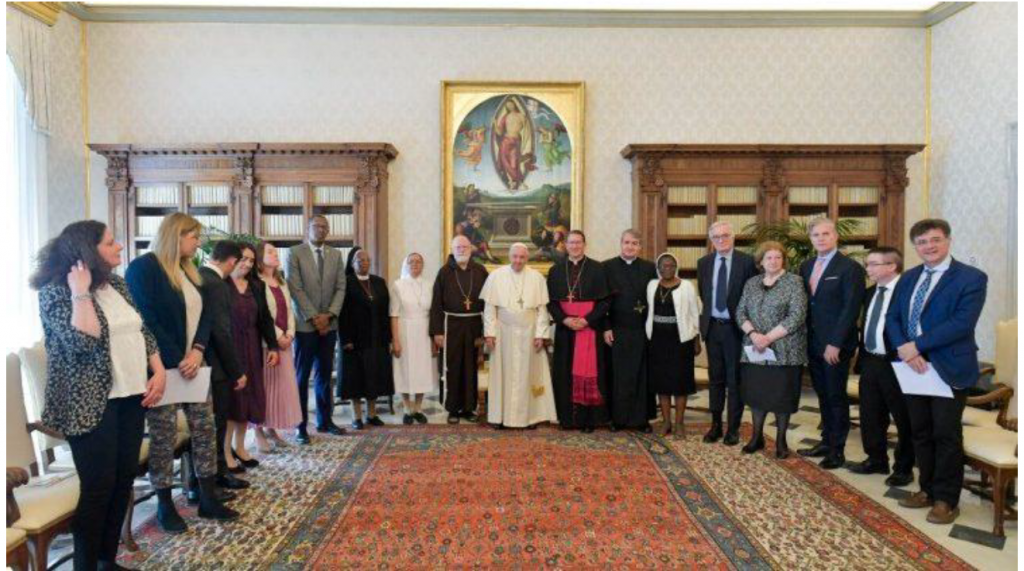
FRANCIS: EVERY ABUSE IS AN OPEN WOUND IN THE BODY OF CHRIST
Pope Francis received 45 members of the Pontifical Commission for the Protection of Minors on Friday, April 29, in the Consistory Hall of the Apostolic Palace. He outlined the future mission of this Commission, which is part of the Congregation for the Doctrine of the Faith, including the establishment of an annual report and closer collaboration with all the other dicasteries.
"I thank you all for your dedication to the work of protecting children, both in your professional lives and in the service of the faithful. Children and vulnerable people are safer in the Church today, also thanks to your commitment," the Pope began by affirming, recalling that the Church must not only be a safe place for children and a place of healing, but also "fully responsible for promoting their rights throughout the world."
Through his love, God transforms suffering.
Indeed, situations in which the dignity of children is threatened are unfortunately not lacking, and this should be of concern to all the faithful and all people of good will, the Pope said, mentioning cases of abuse.
"The road to healing is long and difficult; it requires a well-founded hope, a hope in Him who went to the cross and beyond the cross. The risen Jesus bore, and bears forever, the scars of his crucifixion in his glorified body. These wounds tell us that God saves us not by 'skipping' our sufferings, but through our sufferings, transforming them by the power of his love," explained the Bishop of Rome, reiterating how abuse, in all its forms, is unacceptable.
Indelible abuse
"Sexual abuse of children is particularly serious because it is an attack on life in its fullness. Instead of flourishing, the abused person is hurt, sometimes indelibly," he strongly denounced, citing the example of a letter recently received from a father whose son was abused. "Because of this, he could not leave his room for many years, carrying the consequences of this abuse on a daily basis, even within the family. Abused people sometimes feel trapped between life and death. These are realities that we cannot suppress, no matter how painful they may be," Francis stressed.
The Commission at the time of Praedicate Evangelium
Thus, the testimony of the survivors represents "an open wound in the body of Christ that is the Church. The Pope therefore urges the Commission to work diligently and courageously to make these wounds known, to seek out those who suffer from them and to recognize in these people the witness of our suffering Savior. "This is the path for all of us: bishops, religious superiors, priests, deacons, consecrated persons, catechists, lay faithful. Each member of the Church, according to his or her status, is called to take responsibility for preventing abuse and working for justice and healing," the Holy Father repeated, before elaborating on the future role of the Commission through the Apostolic Constitution Praedicate Evangelium. It becomes an integral part of the Roman Curia, within the dicastery for the Doctrine of the Faith. "Some people might think that this placement could compromise your freedom of thought and action, or perhaps even diminish the importance of the issues you are concerned about. That is not my intention and that is not my expectation. And I invite you to be vigilant so that this does not happen," said the Pope. Francis wished to insist on the "independence" of the Commission, although integrated into the organization chart of the Roman Curia and the Dicastery, but "independent, with a president appointed by the Pope".
Commitment of the Universal Church and the particular Churches
The Commission for the Protection of Minors is established within the dicastery to deal with sexual abuse committed by members of the clergy. And the Holy Father hopes it will propose the best methods for the Church to protect children and vulnerable people and help survivors heal, keeping in mind that justice and prevention are complementary.
"Your close collaboration with the Dicastery for the Doctrine of the Faith and the other dicasteries should enrich your work and, in turn, enrich that of the Curia and the local Churches. I leave it to the Commission and the dicastery to find the most effective way to do this. By working together, they give concrete expression to the Church's duty to protect those entrusted to her. This duty is based on an understanding of the human person in his or her intrinsic dignity, with a special concern for the most vulnerable. Commitment at the level of the universal Church and the particular Churches implement the plan of protection, healing and justice, according to their respective competencies," he said.
(Español) Informe anual al Papa
